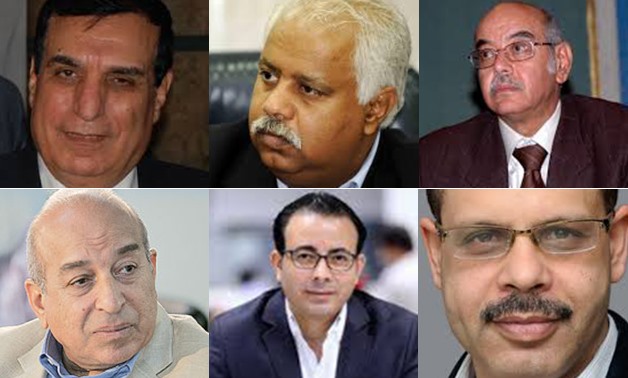
Akram al-Qasas, Morsi Attallah, Galal Aref, Hamdy Rezk, Fami Houwaidi - File photo
CAIRO – 31 May 2017: Egyptian columnists tackled a number of significant issues Wednesday, mainly revolving around the fabrication of an email from Youm7 by Qatar, Egypt’s airstrikes on Libya and the blocking of 21 news websites.
Youm7

Akram Al Qasas
Likes and intentions behind publishing victims’ photos
Youm7 columnist Akram al-Qasas criticized the publication of photography of the victims of terrorist attacks on social networking platforms. He noted that some users publish such images to illustrate how terrible acts of terror are, but called on social media users to respect the dead. He referenced the ‘charter of honor’ that condemns the publication of photos of the dead and of children, lamenting the fact that these rules do not apply to social media.
Al-Qasas acknowledged that some people believe publishing such photos will help promote more terrorist acts, because terrorists consider their circulation to be an act of honor and victory.
Those who have faith in their countries should not fear “immature” email fabrication
Youm7 columnist and Managing Editor Dandarawy Hawary discussed the fabrication of a Youm7 email by Qatari intelligence. He said whoever fabricated the email “lacks experience and talent,” comparing them to preschoolers.
Despite the fabricated email, Youm7 clearly defends noble people in their battle against that “small state,” he said.
“If defending our country is a crime, we are criminals,” Hawary added. He stressed that Egyptians “will never forget how Qatar hated our country.”
Al-Ahram

Morsi Attallah
From Abdel-Nasser to Trump
Columnist Morsi Attallah tackled the American-Saudi talks held in Riyadh in early May. He asserted that Egypt has been eager to defend the security of the Middle East ever since the revolution of the Free Officers Movement in July 1952, and pays great attention to maintain peace on a domestic level first.
Attallah demonstrated the late Gamal Abdel Nasser’s vision, which opposed military alliances. He wrote that Nasser believed the Arab states should be responsible for protecting their own land, that the Middle East’s real security relied on the maintenance of domestic fronts and that aggressors must be confronted and targeted wherever they exist.
Egypt’s current administration proves Nasser’s vision was absolutely correct, wrote Attallah. He praised Egypt’s military airstrikes on Libya that targeted terrorist sites and said that as a result, Egypt “aborted schemes for foreign intervention in our region.”
Al-Akhbar

Galal Aref
War on all fronts
Galal Aref predicted that Egypt’s war against terrorism will last for a long time. He noted that that war is a “life or death battle” because terrorists “target our people, who aborted [the terrorists’] agendas and removed their rule on June 30.”
According to Aref, Egypt does not recognize extremism and refuses to embrace terrorism. He asserted that enemies seek to destabilize the state’s order and impede Egypt’s progress.
Aref, moreover, welcomed the removal of Minya’s security chief after the terrorist attack on a bus carrying Christians to St. Samuel the Confessor’s monastery on Friday. The decision recognizes the existence of security loopholes that should be fixed to avoid potential terrorist acts, he said.
Al-Masry Al-Youm

Hamdy Rezk
Salem Abdel-Galil defends Makari Yonan
Hamdi Rezk discussed the decision taken by Pope Tawadros II to suspend Priest Makari Yonan, preventing him from delivering sermons until further notice following Yonan’s controversial statements against Muslims.
Rezk praised the Pope’s decision, although many Coptic Christians opposed it. He wondered at Sheikh Salem Abdel-Galil’s stance, who criticized the Pope’s decision and defended Yonan’s position. Abdel-Galil said, “I wish the Pope would reconsider his decision because ideas and beliefs should not be judged as long as they do not touch the national fabric.”
While he defended the pope’s decision, he also acknowledged Abdel-Galil’s position on the dissemination of ideas that do not harm the fabric of society.
Al-Shorouk

Fami Houwaidi
Tell me about the blocked websites!
Fahmi Houwaidi tackled the government’s decision to block 21 news websites. He said if the websites supported terrorism in Egypt, there would be two possible scenarios. The first is that the websites would be useless because they could not positively affect Egyptian public opinion. The second is that Egypt would follow in the footsteps of Somalia or Afghanistan.
Houwaidi ruled out the second scenario, saying concrete facts oppose the idea that Egypt would be like Somalia or Afghanistan. While he said he was not surprised there were those that support the block, he was taken aback by the Press Syndicate’s decision to endorse it as well, adding that the syndicate should have defended freedom of expression.





Comments
Leave a Comment